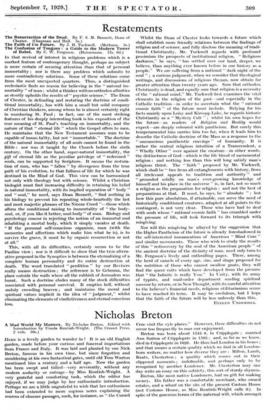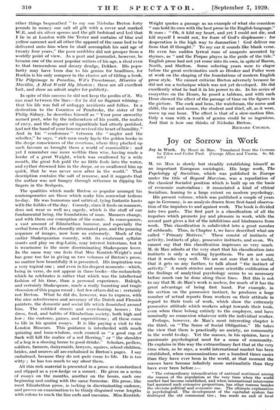Nicholas Breton
HERE is a lovely garden to wander in ! It is an old English garden, made before your curious and funereal importations from France and Italy. It was laid and planted by one Nick Breton, famous in his own time, but since forgotten and mouldering at his own fantastical gates, until old Tom Warton mentioned him a century_ and a half ago. Now the garden has been swept and tidied—very reverently, without any modern audacity or outrage—by Miss Kentish-Wright. A very grateful and- comforting task, which the editor has enjoyed, if we may judge by her enthusiastic introduction. Perhaps we are a little ungrateful to wish that her enthusiasm had been extended to more copious notes explaining the sources of obscure passages, such, for instance, as ".the Cursed.
Crue visit the vyle places." However, these difficulties do not occur too frequently to mar our enjoyment.
Breton was born about 1545-8, in Cripplegate ; married Ann Sutton of Cripplegate in 1593 ; and, as far as we know, died in Cripplegate in 1626. He thus had London in his bones ; and that means a certain quality which we find in all London- born writers, no matter .how. diverse they are : Milton, Lamb, Keati, Chesterton ; a quality which comes out in their slippered moments ; indefinable, and perhaps only to be recognized by another Londoner. Mr. Chesterton may one day write an essay on this subtlety, this sort of sturdy shyness.
Breton, like most native Londoners, had no gift for making money. His father was a comfortable merchant, who owned estates, and a wharf on the site of the present Custom House (not Customs House, as. Miss .Kentish-Wright calls it). In spite of the.izenerons terms of the paternal will, which amongst
other things bequeathed " to my son Nicholas Breton forty pounds in money one salt all gilt with a cover and marked W.E. and six silver spoons and the gilt bedstead and bed that I lie in at London with the Tester and curtains of blue and yellow sarcenet and all other the apparel of the same bed to be delivered unto him when he shall accomplish his said age of twenty four years," the poor scribbler did not prosper from a worldly point of view. As a poet and journalist, however, he became one of the most popular writers of his age, a rival even to that tremendous and dreary drudge, Dekker. His popu- larity may have been due to his genius for headlines, for Ruskin is his only compeer in the elusive art of titling a book. The Pilgrimage to Paradiso, Wit's Trenchmour, Miseries of Mavillia, A Mad World My Masters ; these are all excellent bait, and show an adroit angler for publicity.
In spite of this success he did not keep the profits of it. We can read between the lines—for he did no flagrant whining— that his life was full of unhappy accidents and follies. In a dedication to the Countess of Pembroke, the sister of Sir Philip Sidney, he describes himself as " Your poor unworthy named poet, who by the indiscretion of his youth, the malice of envy, and the disgrace of ingratitude had utterly perished, had not the hand of your honour revived the heart of humility." And in his " conference " between the " angler and the scholler," he says, " rich men onely layde the golden hooke in the deepe consciences of the covetous, where they plucked up such favours as brought them a world of commoditie : and yet I remember one more welthie then wise, having made a hooke of a great Waight, which was swallowed by a wide mouth, the great fish puld the no little foole into the water, and eyther drowned him in the deepe, or so swallowed him up quick, that he was never seen after in the world." That description contains the salt of remorse, and it suggests that the author was not hungry through reticence in dipping his fingers in the fleshpots.
The qualities which made Breton so popular amongst his contemporaries are those which make him somewhat tedious to-day. He was humorous and satirical, tying fantastic knots with the foibles of the day. Comedy, since it feeds on manners, does not wear so well as t ragedy, which is the stuff of our fundamental being, the foundations of man. Manners change, and with them our conception of the comic. In consequence, a vast amount of Elizabethan humour, and especially the verbal form of it, the absurdly attenuated pun, and the punning sequence of images, now bore us extremely. Much of the earlier Shakespearian comedy, with its exuberant syllabic stunts and play on dog-Latin, may interest historians, but it is wearisome to the more discriminating Shakespeare lover. In the same way one feels that Miss Kentish-Wright's zeal has gone too far in giving us two volumes of Breton's prose, no matter how beautifully it is presented. His inspiration was a very topical one ; and even in his deepest moments—which, being in verse, do not appear in these books—the melancholy which he celebrates is rather that which was the intellectual fashion of his time, than a personal experience. Raleigh, and certainly Shakespeare, made a really haunting and tragic obsession of this pagan mood ; but few others did so : certainly not Breton. What he did do, however, was to express, with the nice selectiveness and accuracy of the Dutch and Flemish painters, the domestic and social life which flourished around him. The cobbled streets and over-leaning houses ; the dress, food, and habits of Elizabethan society, both high and low ; the customs, games, and superstitions ; all these come to life in his quaint essays. It is like paying a visit to the London Museum. This guidance is interlarded with much quizzing and bum-wisdom, such council as " a good cup of Sack will kill the malice of a red Herring," or "the, shoulder of a hog is a shooing home to good drinke." Scholars, pedlers, soldiers, farmers, dairymaids, lawyers, squires, school children, brides, and usurers all are embalmed in Breton's pages. I say embalmed, because they do not quite come to life. He is too witty ; he has too much to say about them.
All this rich material is presented in a prose as standardized and elipped-as a yew-hedge or a sonnet. He gives us a series of essays on the months, another on the hours, each one beginning and ending with the same formulae. His prose, like most Elizabethan prose, is lacking in discriminating cadence, and proves on examination to be thinly disguised verse lengths with colons to mask the line ends and caesuras. Miss .Kentish-
Wright quotes a passage as an example of what she considers " can hold its own with the best prose in the English language." It runs : " Oh, it kild my heart, and yet I could not die, and kill myself I would not for feare of God's displeasure : for desperation is the high way to damnation ! God deliver me from that ill thought." To my ear it sounds like blank verse. He even has sudden lyrical runs of anapests accented by rhymes, as " and the Porpas playes in the pride of the tide." English prose had not yet come into its own, in spite of Bacon, North, and Shelton. Some sobering years were to elapse before the great ecclesiastics such as Hooker and Fuller were at work on the shaping of the foundations of modern English prose style. We cannot criticize Breton adversely because he did not use a technique which was not yet developed. He did excellently what he had it in his power to do. In his series of essayettes on the Hours, he posed a tableau, and with each Hour showed the effect of the passage of time on the figures in the picture. The cock and hens, the watchman, the nurse and child, the cat and mouse, the student and thief, all, as it were, move up one hour. The effect is that of a slow-motion film. Only a man with a touch of genius could be so ingenious. And that is how one thinks of Nicholas Breton.
RICHARD CHURCH.

































 Previous page
Previous page